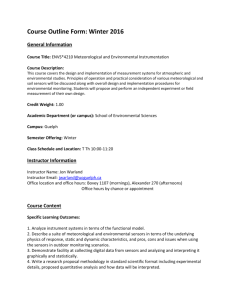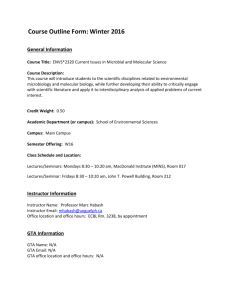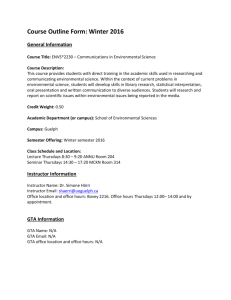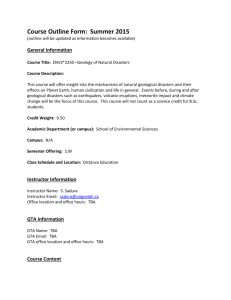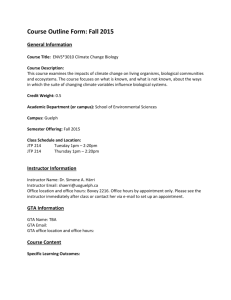PBIO*4000 Molecular and Cellular Aspects of Plant
advertisement
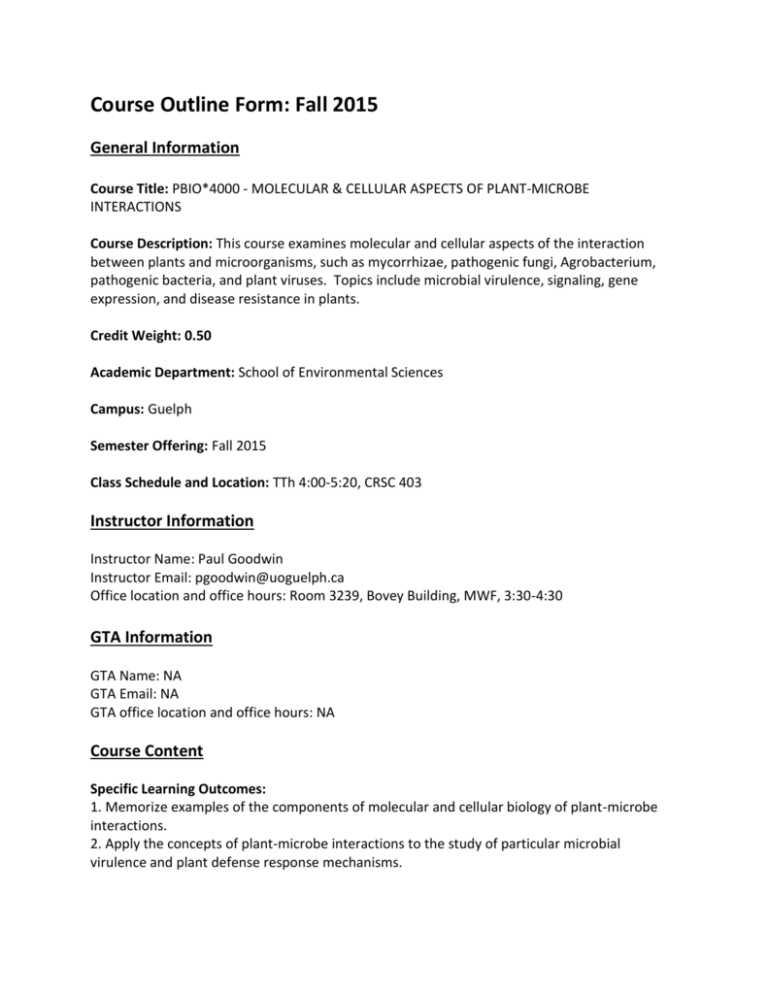
Course Outline Form: Fall 2015 General Information Course Title: PBIO*4000 - MOLECULAR & CELLULAR ASPECTS OF PLANT-MICROBE INTERACTIONS Course Description: This course examines molecular and cellular aspects of the interaction between plants and microorganisms, such as mycorrhizae, pathogenic fungi, Agrobacterium, pathogenic bacteria, and plant viruses. Topics include microbial virulence, signaling, gene expression, and disease resistance in plants. Credit Weight: 0.50 Academic Department: School of Environmental Sciences Campus: Guelph Semester Offering: Fall 2015 Class Schedule and Location: TTh 4:00-5:20, CRSC 403 Instructor Information Instructor Name: Paul Goodwin Instructor Email: pgoodwin@uoguelph.ca Office location and office hours: Room 3239, Bovey Building, MWF, 3:30-4:30 GTA Information GTA Name: NA GTA Email: NA GTA office location and office hours: NA Course Content Specific Learning Outcomes: 1. Memorize examples of the components of molecular and cellular biology of plant-microbe interactions. 2. Apply the concepts of plant-microbe interactions to the study of particular microbial virulence and plant defense response mechanisms. 3. Orally present results and conclusions in class for selected research papers in molecular plant-microbe interactions. 4. Evaluate and analyze results and conclusions in class for selected research papers in molecular plant-microbe interactions. 5. Demonstrate the ability to observe similarities and differences in the techniques and approaches used to generate new knowledge in molecular plant-microbe interactions. Lecture Content: Introduction Plant disease defenses Host-pathogen recognition and PAMPs Host-pathogen recognition and Effectors Induced disease resistance Fungal pathogenicity Bacterial pathogenicity Endophytes Viral pathogenicity Colloquium of graduate student presentations of research articles Labs: NA Seminars: NA Course Assignments and Tests: Assignment or Test Due Date Mid-term exam Oral quizzes Thur, Oct 22 TBA Contribution to Final Mark (%) 36 28 Learning Outcomes Assessed 1, 2 3, 4, 5 Additional Notes: - Exams are to be completed in pen only. Essay questions to be completed using full sentences and paragraphs. - Examination questions include information from class discussions of research papers, graduate student colloquium presentations and lecture material. - Oral quizzes are part of in-class discussions of each research paper linked to a specific lecture topic (topics listed above in the lecture content). The date of the oral quiz of each research paper (papers listed below in the required text) will be announced in class following completion of the lecture material for the corresponding topic. It is important to thoroughly read, analyze and prepare to answer questions for the oral quiz of each research paper. Final examination date and time: Fri, Dec. 11, 19:00-21:00 Final exam weighting: 36% Course Resources Required Texts (The research papers listed below are available electronically at the Library (http://sfx.scholarsportal.info/guelph/az) and/or by searching the web (http://www.google.ca/) using the title of the article. These papers are the basis of the oral quizzes and in-class discussions): Topic of plant disease defenses: Guo, A., Salih, G. and Klesig, D.F. 2000. Activation of a diverse set of genes during the tobacco resistance response to TMV is independent of salicylic acid; induction of a subset is also ethylene independent. Plant Journal 21: 409-418. Topic of host-pathogen recognition and PAMPs: Segonzac, C., Feike, D., Gimenez-Ibanez, S., Hann, D.R., Sipfel, C. and Rathjen, J.P. 2011. Hierarchy and roles of pathogen-associated molecular pattern-induced responses in Nicotiana benthamiana. Plant Physiology 156: 687699. Topic of host-pathogen recognition and effectors: Swiderski, M.R. and Innes, R.W. 2001. The Arabidopsis PBS1 resistance gene encodes a member of a novel protein kinase subfamily. Plant Journal 26: 101-112. Topic of induced disease resistance: Van der Ent, S., Van Hulten, M. and Pozo, M.J, et al. 2009. Priming of plant innate immunity by rhizobacteria and beta-aminobutyric acid: differences and similarities in regulation. New Phytologist 183: 419-431. Topic of fungal pathogenicity: Voigt, C.A., Schäfer, W. and Salomon, S. 2005. A secreted lipase of Fusarium graminearum is a virulence factor required for infection of cereals. Plant Journal 42: 364-375. Topic of bacterial pathogenicity: Wei Guo, Lu-Lu Cai, Hua-Song Zou, Wen-Xiu Ma, Xi-Ling Liu, Li-Fang Zou, Yu-Rong Li, Xiao-Bin Chen and Gong-You Chen. 2012. Ketoglutarate transport protein KgtP is secreted through the type III secretion system and contributes to virulence in Xanthomonas oryzae pv. oryzae. Applied and Environmental Microbiology 78: 5672-5681. Topic of endophytes: Theocharis, A, Bordiec, S, Fernandez, O, Paquis, S, Dhondt-Cordelier, S, Baillieul, F, Clement, C, Barka, EA. 2012. Burkholderia phytofirmans PsJN primes Vitis vinifera L. and confers a better tolerance to low nonfreezing temperatures. Molecular Plant-Microbe Interactions 25: 241-249. Topic of viral pathogenicity: Kramer, S.R., Goregaoker, S.P. and Culver, J.N. 2011. Association of the Tobacco mosaic virus 126 kDa replication protein with a GDI protein affects host susceptibility. Virology 414: 110-118. Recommended Texts: Agrios, G.N. 2005. Plant Pathology, 5th Ed., Academic Press. Parker, J. 2009. Molecular Aspects of Plant Disease Resistance. Annual Plant Reviews, Volume 34. Wiley-Blackwell. Walters, D. 2010. Plant Defense: Warding off attack by pathogens, herbivores and parasitic plants. Blackwell Publishers. [electronic version] Watson, J.D. et. al. 2008. Chapter 20: Techniques of Molecular Biology. In: Molecular Biology of the Gene. Lab Manual: NA Other Resources: Lecture notes, illustrations and hand-outs for the course are not available on the web. Field Trips: NA Additional Costs: NA Course Policies Grading Policies: - Exams are graded for knowledge of specific lecture and class discussion material. - Oral quiz marks are based on responses to specific questions for each research paper (papers listed above in the required text section). The instructor will choose questions for students to answer orally in class. - Grading of responses to oral quiz questions are based on the ability to show depth of understanding and the ability to evaluate and analyze the background, techniques, results and conclusions of each research paper. - If the oral quiz of a research paper is missed, then the student must contact the instructor within 7 days to arrange a make-up time for discussion of that paper. Course Policy on Group Work: Group work is allowed to prepare for class discussions only. Course Policy regarding use of electronic devices and recording of lectures: Electronic recording of classes is expressly forbidden without consent of the instructor. When recordings are permitted they are solely for the use of the authorized student and may not be reproduced, or transmitted to others, without the express written consent of the instructor. University Policies Academic Consideration: The University of Guelph is committed to supporting students in their learning experiences and responding to their individual needs and is aware that a variety of situations or events beyond the student's control may affect academic performance. Support is provided to accommodate academic needs in the face of personal difficulties or unforeseen events in the form of Academic Consideration. Information on regulations and procedures for Academic Consideration, Appeals and Petitions, including categories, grounds, timelines and appeals can be found in Section VIII (Undergraduate Degree Regulations and Procedures) of the Undergraduate Calendar. Academic Misconduct: The University of Guelph is committed to upholding the highest standards of academic integrity and it is the responsibility of all members of the University community, faculty, staff, and students to be aware of what constitutes academic misconduct and to do as much as possible to prevent academic offences from occurring. University of Guelph students have the responsibility of abiding by the University's policy on academic misconduct regardless of their location of study; faculty, staff and students have the responsibility of supporting an environment that discourages misconduct. Students need to remain aware that instructors have access to and the right to use electronic and other means of detection. Please note: Whether or not a student intended to commit academic misconduct is not relevant for a finding of guilt. Hurried or careless submission of assignments does not excuse students from responsibility for verifying the academic integrity of their work before submitting it. Students who are in any doubt as to whether an action on their part could be construed as an academic offence should consult with a faculty member or faculty advisor. Detailed information regarding the Academic Misconduct policy is available in Section VIII (Undergraduate Degree Regulations and Procedures) of the Undergraduate Calendar. Accessibility: The University of Guelph is committed to creating a barrier-free environment. Providing services for students is a shared responsibility among students, faculty and administrators. This relationship is based on respect of individual rights, the dignity of the individual and the University community's shared commitment to an open and supportive learning environment. Students requiring service or accommodation, whether due to an identified, ongoing disability or a short-term disability should contact the Student Accessibility Services (SAS), formerly Centre for Students with Disabilities (CSD), as soon as possible. For more information, contact SAS at 519-824-4120 ext. 56208 or email sas@uoguelph.ca or visit the Student Accessibility Services website (http://www.uoguelph.ca/csd/). Course Evaluation Information: End of semester course and instructor evaluations provide students the opportunity to have their comments and opinions used as an important component in the Faculty Tenure and Promotion process, and as valuable feedback to help instructors enhance the quality of their teaching effectiveness and course delivery. While many course evaluations are conducted in class others are now conducted online. Please refer to the Course and Instructor Evaluation Website for more information. Drop period: The drop period for single semester courses starts at the beginning of the add period and extends to the Fortieth (40th) class day of the current semester (the last date to drop a single semester courses without academic penalty) which is listed in Section III (Schedule of Dates) of the Undergraduate Calendar. The drop period for two semester courses starts at the beginning of the add period in the first semester and extends to the last day of the add period in the second semester. Information about Dropping Courses can be found in Section VIII (Undergraduate Degree Regulations and Procedures) of the Undergraduate Calendar. Additional Course Information Approximate Schedule Date Thursday, September 10 Tuesday, October 13 Near end of semester Tuesday, December 1 Thursday, December 3 Activity First Class Fall Study Break (no class) Graduate Student Colloquium Presentations Last Regularly Scheduled Class Reschedule of Fall Study Break (Tuesday Schedule)
